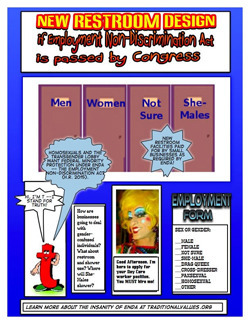What Argument Against The Renewed ERA Could Feminists Face?
I wrote a slightly edited down version of this essay for Feministing that posted on August 10, 2011. I believe the ERA is a issue at the intersection of LGBT and women's equal rights.
What would one of the arguments against the Equal Rights Amendment (ERA) would likely be if serious community effort were now to be made to pass the amendment into law?
 Recently Rachel Maddow ran a segment entitled Equal Rights Amendment Sees Renewed Interest on her MSNBC show. In the segment, she indicated that the ERA has been reintroduced in the House of Representatives {by Rep. Carolyn Maloney (D-NY)} and the Senate {Sen. Robert Menendez (D-NJ)} as a response to the recent Walmart decision by the Supreme Court of the United States.
Recently Rachel Maddow ran a segment entitled Equal Rights Amendment Sees Renewed Interest on her MSNBC show. In the segment, she indicated that the ERA has been reintroduced in the House of Representatives {by Rep. Carolyn Maloney (D-NY)} and the Senate {Sen. Robert Menendez (D-NJ)} as a response to the recent Walmart decision by the Supreme Court of the United States.
The plain language of the ERA, in the 1970's and now, is as follows:
Equality of rights under the law shall not be denied or abridged by the United States or by any state on account of sex.
In the segment, Maddow identified the 1970's arguments against the ERA to show how poorly those arguments hold up today.
Maddow identified columnist Phyllis Schlafly as the 1970's leading opponent of the ERA. Schlafly's, and her peers', arguments against the ERA included "the potty problem" -- legalization of unisex bathrooms -- as well as the arguments that making men and women equal under the law would make women and men the same thing; would push women out of the home and into the workplace; would allow "homosexuals" to be married, adopt children, and teach in schools; would (under a draft) force women to go into military combat.
 Maddow asks the question at the near the end of her piece:
Maddow asks the question at the near the end of her piece:
Why couldn't the ERA become law now? Do the arguments from the 1970's still stand up now? Really?
Most of the arguments against the ERA in the 1970's don't hold up as well now -- most of these arguments wouldn't resonate with the general public to the level that these did in the 1970's. You could count on though that the argument about how mandating equality would mean erasing all differences between men and women would still be used as a key argument, as well as the argument against marriage equality.
So if feminist interest, and the general public's interest, in the ERA returned to prominence in the 2010's, what would be the new arguments against the ERA?
I have a good idea what one of the major arguments against the ERA would be.
In the trans community, we refer to a likely argument as the "bathroom bill" meme. It's transgender specific: the argument is that "men in dresses" will enter women's restrooms and prey on women and children in public restrooms. This argument in brought up by religious right adherents pretty much every time employment or public accommodation antidiscrimination legislation that includes protections based on sexual orientation and/or gender identity (e.g. here, here, here, and here).
[More below the fold.]
A radio ad found on the Massachusetts Family Institute's No Bathroom Bill website (and playing on Massachusetts airwaves) is here, and it encapsulates the "bathroom bill" meme into a 30-second spot:
The messaging against trans women in public women's restrooms hasn't changed much since Colorado's SB2. Have a listen to the May 2008 radio ad from Focus On The Family, and listen to the extremely similar messaging:
It doesn't take much of an imagination to see that the same "bathroom bill" meme that's used to argue against ordinary equality for transgender people in antidiscrimination legislation would be used by the religious right and other social conservatives against the ERA.
Should the ERA again become a priority for feminists, the feminist community would then be confronted with choices on how to combat the "bathroom bill" meme:
Feminist community could take the position of the Massachusetts Attorney General, Martha Coakley in arguing that the burden of proof is on those who use the meme to prove that not only is bathroom predation by trans people is significant, and is more significant in jurisdictions that currently have gender identity protections on the books. Of course, a fourth alternative is that feminist community so divides over how to approach the "bathroom bill" meme against ERA that the feminist community becomes functionally paralyzed -- or functionally implodes. So if the ERA should again become a prominent feminist issue, then feminist community is going to have to come to terms with the reality that trans women really exist and, via the "bathroom bill" meme, would be a prominent part of the public discourse about the amendment. In my mind, how the feminist community would come to terms with the reality of trans women is far from settled.
Feminist community could also choose embrace the arguments of second wave feminists who -- like those on the religious right -- argue that trans women in women's restrooms are predators, and seek to add language to the ERA that ins some way allows trans women to be excluded from women's restrooms.
Feminist community could also choose not to embrace the ERA because much of the feminist community doesn't accept trans women as women, and they believe that the ERA would result in them having to embrace trans women as their community sisters.
Pam Spaulding's Blog
- Pam Spaulding's profile
- 1 follower



